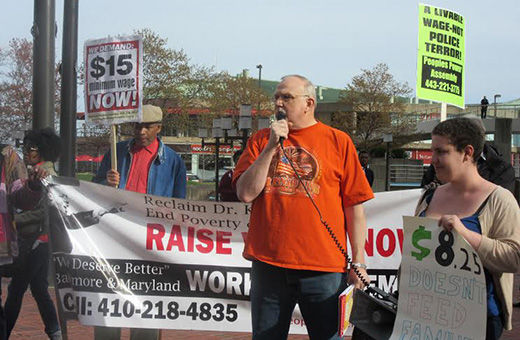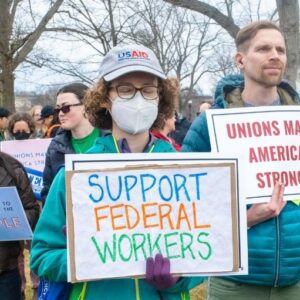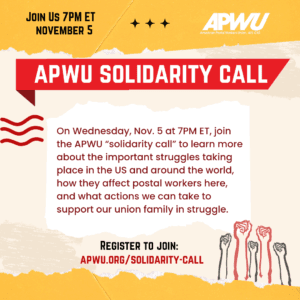June 1, 2015
Fight for 15 Pushes On

(This article first appeared in the July-August 2015 issue of The American Postal Worker magazine.)
On April 15, hundreds of thousands of workers in 200 cities joined together to make their demands heard: Raise the minimum wage to $15 an hour and grant workers the right to unionize.
Better known as the “Fight for 15,” the campaign is comprised of workers, students, racial justice activists, advocates for climate change solutions, small business owners and unions. The groups have been fighting for three years for a higher minimum wage and the right to organize.
This year’s actions were the biggest to date.
How It Started
The “Fight for 15” campaign took off in November 2012, when fast-food workers united to fight the corporate giants, including McDonald’s, Burger King and Wendy’s. Many in the industry do not earn enough to cover basic necessities, such as food and housing.
With the federal minimum wage stagnant at $7.25 an hour since July 2009, employees working 40 hours per week at the minimum wage earn as little as $15,000 a year.
Without a livable wage, 52 percent of fast-food workers are forced to depend on public assistance to provide for their families. Taxpayers carry the burden, paying $7 billion per year to make up the shortfall.
“This amounts to a subsidy by taxpayers for McDonald’s, Burger King and Wendy’s,” said APWU President Mark Dimondstein. “It’s an absolute disgrace!”
‘Scraping By’
Fast food workers have been at the forefront of this fight, but workers in other industries, including home care attendants and childcare workers, have echoed the demands for a living wage and the right to unionize.
Andrew Olson attended a march in Denver on April 15. The 25-year-old couldn’t afford to attend college and instead works at a McDonald’s in Aurora, CO, earning about $8.60 an hour. His fiancée works at a Dollar Tree, earning minimum wage. They use food stamps and Medicaid to get by.
“The taxpayers shouldn’t have to pay for what we need to survive,” he told the Los Angeles Times. “It should be between employees and companies to determine a living wage.”
He said that although he will be getting a small raise soon, it won’t make much of a difference.
“Just because I work in fast food, does that mean I should have to just scrape by?” he said.
Fight for 15 and Tax Day
The Fight for 15 events coincided with Tax Day, when many APWU locals held contract campaign activities reminding the public that “Your Post Office Receives Zero Tax Dollars.”
Several members of APWU locals participated in protests that addressed both issues. Baltimore Local 181 joined a 100 other union members in McKeldin Square, rallying and marching to both a McDonald’s location and a post office, and stressing the need for better wages and working hours for all workers. Local President George Askew highlighted the threat of the Postal Service’s partnership with Staples (see page 10).
Other locals that passed out flyers at post offices on Tax Day included: Boston Area Local, Greensburg/Foothills Area Local, Manchester Area Local, New York Metro Area Local, Richmond Area Local, Tucson Area Local, California Area Local, Oakland Area Local and Northern Virginia Area Local.



